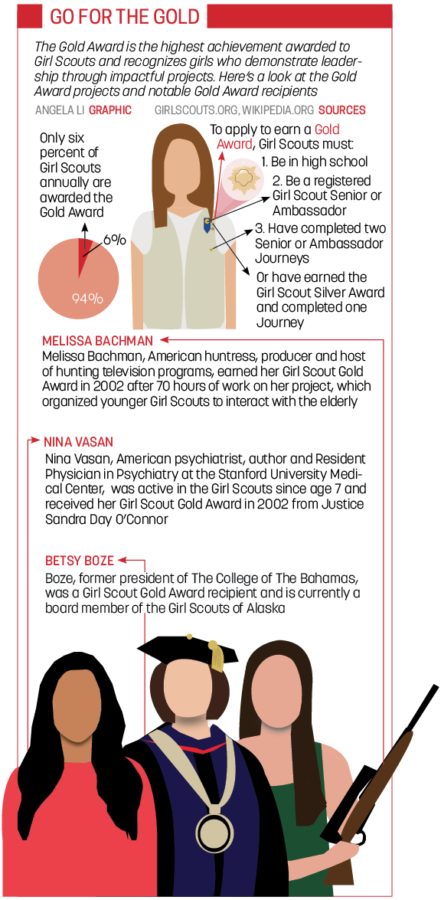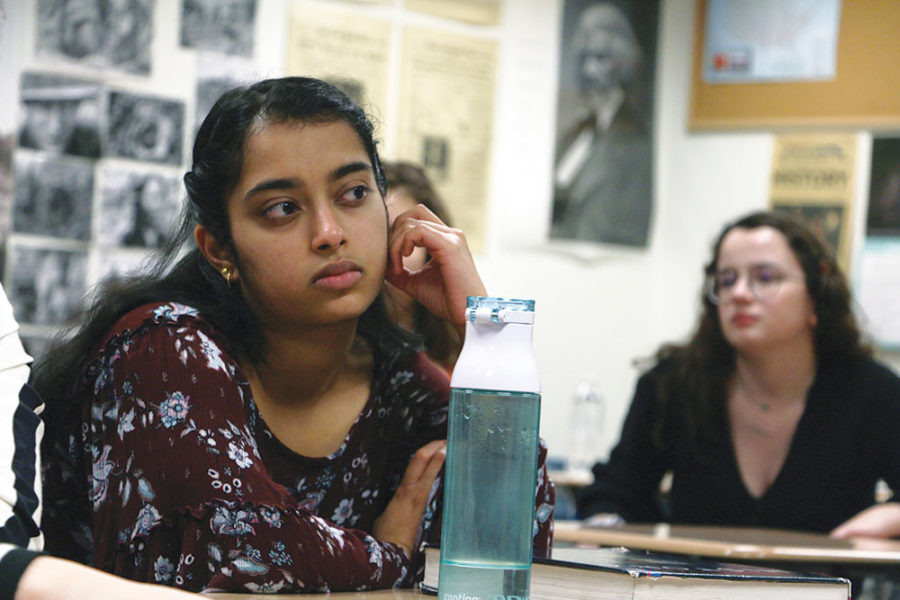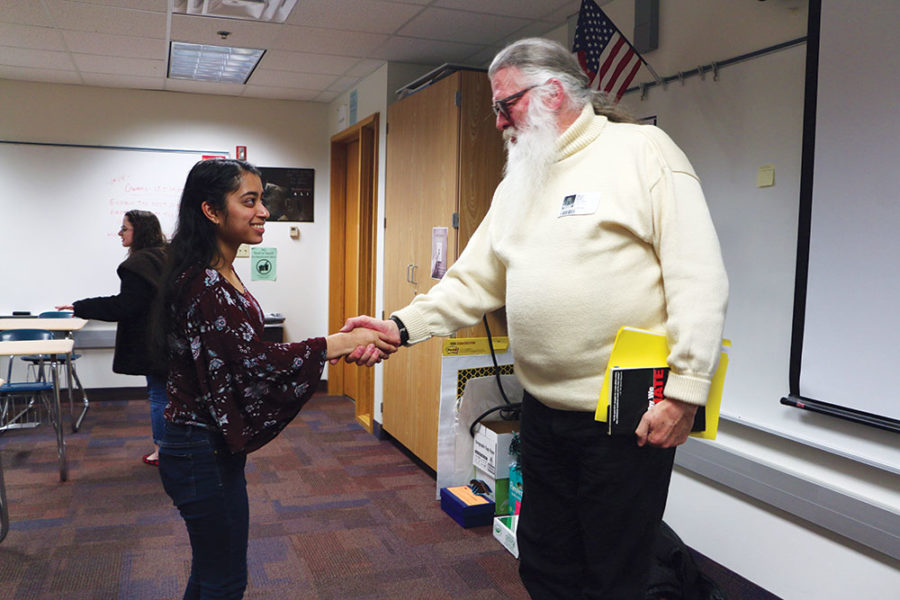For Sapna Nakshatri, Girl Scouts and junior, Girl Scouts has always been an integral part of her life. She joined the program in second grade and started out her experience with Troop 1500. Even when the troop’s leader quit after her sophomore year, Nakshatri continued on with the program by joining Troop 88. Now she is working toward the most prestigious and time-consuming award the program offers—the Gold Award. Although Nakshatri has continued to involve herself in Girl Scouts, a recent Christian Science Monitor article reveals that national Girl Scout membership has fallen by nearly half since its peak in 2003.

Despite the perceived disinterest of others around her, Nakshatri said, “What I like most about Girl Scouts is that you get to do interesting activities you wouldn’t really get to do on a regular basis. For example, a couple of weeks ago we went to the CANDLES Holocaust Museum and Education Center, and we heard Eva Kor, who is a Holocaust survivor. I wouldn’t have gone out of my way to do that if I wasn’t in Girl Scouts.”

While many girls quit, it is not uncommon for girls to continue to participate in Girl Scouts. Nakshatri said although her original troop was huge during elementary school, only three of those girls, including Nakshatri, have continued with Girl Scouts into high school. Additionally, according to Troop 88’s leader Ruth Perkins, Nakshatri is one of only two girls completing the Gold Award in her 10-person troop.
Perkins said one of the reasons why girls don’t continue is because they have many other activities that take their time.
“I think sports and other extracurricular activities are the main reasons (why girls quit Girl Scouts). Sports is probably the one thing (that conflicts the most) because of their practices are so demanding,” she said.
Along those lines, Grace Kubek, a former member of a different Carmel troop and freshman, said, “I just had many outside conflicts. I wasn’t enjoying it enough to give up other commitments such as theater and basketball, which I played at the time. While I really enjoyed Girl Scouts, I loved other activities more than it. For me, the people and activities were really great, but I just didn’t have enough time for it.”
Still, the idea that girls do not have enough time for Girl Scouts is one Nakshatri doesn’t really feel rings true for her.
She said, “For me, the best part about Girl Scouts is that it is very fluid. You don’t have a set date of when you go where, but here and there you just go places. A couple of days before an event, it’s like, ‘Hey, do you want to go here?’ and you go if you are free. I don’t think it is too big of a time commitment.”
Perkins said, as a troop leader, she tries to make the events the troop participates in as flexible as possible because of how busy they are on a day-to-day basis.
She said, “They participate when they can. I know I won’t see most of the girls often when they are really busy, but when there are quiet times I expect to see them more often. By the time they are in high school, they are the ones who are setting the pace. They are determining how often they meet and what they want to do.”
Independence, and the flexibility that comes with it, is one of the main values of any Girl Scout high school troop. According to girlscouts.org, the program is trying to move away from the traditional image of the “three C’s,” which are cookies, campfires and crafts, to the acronym GIRL, which stands for Go-getter, Innovator, Risk-taker and Leader.
Nakshatri said, “You just don’t see a lot of service until later in Girl Scouts. I think if people wait a while (they will start to enjoy Girl Scouts more). Middle school is a weird time with Girl Scouts. You don’t know exactly what you are doing, especially if you don’t get your Silver Award. You are kind of in that in-between stage because you are a little too old for crafts, but a little too young for a lot of responsibility.”
Kubek, who quit Girl Scouts in middle school, said part of the reason why she quit was because she couldn’t spend as much time as she would like on activities she really enjoyed.

She said, “I really liked the forensics unit and the time when we made toys for dogs, but there were so many other units and things that weren’t really my style. I was just not able to really do the things I liked all the time.”

































![AI in films like "The Brutalist" is convenient, but shouldn’t take priority [opinion]](https://hilite.org/wp-content/uploads/2025/02/catherine-cover-1200x471.jpg)









































![Review: “The Immortal Soul Salvage Yard:” A criminally underrated poetry collection [MUSE]](https://hilite.org/wp-content/uploads/2025/03/71cju6TvqmL._AC_UF10001000_QL80_.jpg)
![Review: "Dog Man" is Unapologetically Chaotic [MUSE]](https://hilite.org/wp-content/uploads/2025/03/dogman-1200x700.jpg)
![Review: "Ne Zha 2": The WeChat family reunion I didn’t know I needed [MUSE]](https://hilite.org/wp-content/uploads/2025/03/unnamed-4.png)
![Review in Print: Maripaz Villar brings a delightfully unique style to the world of WEBTOON [MUSE]](https://hilite.org/wp-content/uploads/2023/12/maripazcover-1200x960.jpg)
![Review: “The Sword of Kaigen” is a masterpiece [MUSE]](https://hilite.org/wp-content/uploads/2023/11/Screenshot-2023-11-26-201051.png)
![Review: Gateron Oil Kings, great linear switches, okay price [MUSE]](https://hilite.org/wp-content/uploads/2023/11/Screenshot-2023-11-26-200553.png)
![Review: “A Haunting in Venice” is a significant improvement from other Agatha Christie adaptations [MUSE]](https://hilite.org/wp-content/uploads/2023/11/e7ee2938a6d422669771bce6d8088521.jpg)
![Review: A Thanksgiving story from elementary school, still just as interesting [MUSE]](https://hilite.org/wp-content/uploads/2023/11/Screenshot-2023-11-26-195514-987x1200.png)
![Review: "When I Fly Towards You", cute, uplifting youth drama [MUSE]](https://hilite.org/wp-content/uploads/2023/09/When-I-Fly-Towards-You-Chinese-drama.png)
![Postcards from Muse: Hawaii Travel Diary [MUSE]](https://hilite.org/wp-content/uploads/2023/09/My-project-1-1200x1200.jpg)
![Review: "Ladybug & Cat Noir: The Movie," departure from original show [MUSE]](https://hilite.org/wp-content/uploads/2023/09/Ladybug__Cat_Noir_-_The_Movie_poster.jpg)
![Review in Print: "Hidden Love" is the cute, uplifting drama everyone needs [MUSE]](https://hilite.org/wp-content/uploads/2023/09/hiddenlovecover-e1693597208225-1030x1200.png)
![Review in Print: "Heartstopper" is the heartwarming queer romance we all need [MUSE]](https://hilite.org/wp-content/uploads/2023/08/museheartstoppercover-1200x654.png)



